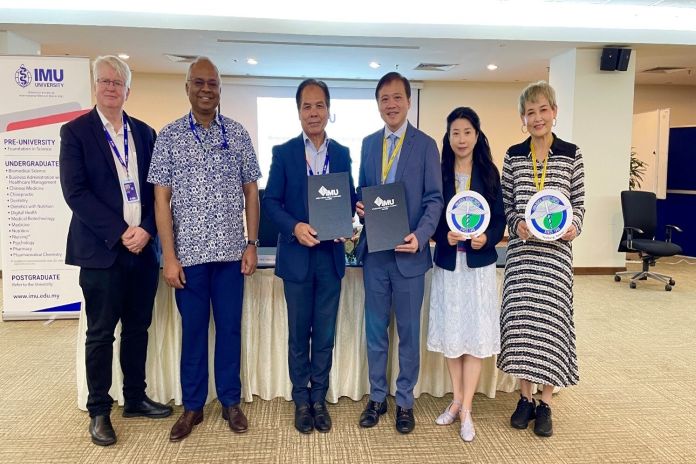- Wistron and imedtac jointly promote leading medical products with CMUH in Malaysia
TAICHUNG, Taiwan – China Medical University Hospital (CMUH, Taiwan) and the Malaysian International Medical University (IMU), the first and top private medical and health science university in Malaysia, jointly signed a memorandum of understanding (MOU) on international development in May.
The MOU will provide a platform to train medical personnel and facilitate medical exchanges. Meanwhile, CMUH collaborated with imedtac, a provider of Smart Hospital solutions, and Wistron (Keeogo), a developer of lower limb exoskeleton robots, to participate in the “IMU-2024 Next Generation of Care: Merging Healthcare & Technology Conference” and Exhibition, jointly promoting CMUH’s international medical services and Taiwan’s outstanding medical products. Both events signify an important task of connecting Taiwanese medical schools and health industries with Malaysia.
These achievements align with the requirements of Taiwan’s Ministry of Health and Welfare’s (MOHW) New Southbound Policy. CMUH is in its third year of implementing this policy.
The New Southbound Policy, set by MOHW, has made substantial achievements in Malaysian international medical tourism in Taiwan, which is seen as a new growth opportunity for Taiwan’s medical institutions post-pandemic. Under the leadership of Superintendent Der-Yang Cho, CMUH has successfully implemented the New Southbound Policy since 2022, expanding Taiwan’s specialized medical care, including cancer cell therapy, to Malaysia, Brunei, and Singapore, significantly attracting international medical communications. In 2023, CMUH’s international patients from Malaysia increased by 256 times, and from Brunei by 47 times compared with those in 2022. Medical tourism has not only benefited the hospital but also attracted numerous international patients to Taichung City, further facilitating international expansion for Taiwanese medical manufacturers.
Assistant Director General Wu Ling-Ying of MOHW in Taiwan stated that the benefits of New Southbound medical cooperation and industrial development, as part of the medium-to-long-term plan in its third year, are clearly evident, with promising prospects ahead.
Thanks to the promotion of the New Southbound Policy, CMUH has extended its specialized medical care to Malaysia (Kuala Lumpur, Sarawak, Sabah) and Brunei, resulting in a remarkable increase in health checkups and disease treatments.
According to Aichi Chou, CEO of the International Center at CMUH, CMUH’s leading medical treatments, including brain cancer therapy, minimally invasive cardiac procedures for various cardiovascular diseases (atrial fibrillation, arrhythmia, aortic valve replacement, peripheral vascular occlusion, etc.), non-invasive treatment for severe tremors using “MRgFUS (Magnetic Resonance-guided Focused Ultrasound),” and minimally invasive surgery for skull base tumors, have improved the health of many critically ill patients in Malaysia, enhancing CMUH’s reputation in the country. Furthermore, CMUH led a team to Kuala Lumpur in Malaysia on April 29, 2024, for the first surgery demonstration of the “Asia Physician Minimally Invasive Surgery Training Platform” in collaboration with the AFSM (Academy for Silent Mentor).
Taichung City is already Taiwan’s second-largest city and a benchmark for livable cities. It boasts internationally renowned Fen Chia Night Market, as well as internationally acclaimed venues like the National Taichung Theater, Luce Memorial Chapel, and the Asia University Museum of Modern Art, showcasing the works of Pritzker Prize-winning architects. It also has the Gu Guan Hot Springs and is adjacent to the Sun Moon Lake international tourist destination, showing immense potential for international medical tourism development.
CMUH is leveraging its resources through the promotion of the New Southbound Policy, allowing international visitors to experience Taiwan’s excellent medical technology and services firsthand and contributing to a new wave of economic value in Taichung City’s medical tourism post-pandemic.





